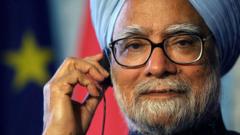The passing of Manmohan Singh, who led India through pivotal economic reforms and trials, has prompted a reevaluation of his significant contributions to the nation. Known for his reserved demeanor, Singh was not just a gentle leader but also a figure of resilience during turbulent times, leaving behind a legacy that reshaped the country's political and economic landscape.
Manmohan Singh: The Gentle Leader Who Shaped Modern India

Manmohan Singh: The Gentle Leader Who Shaped Modern India
Reflecting on the legacy of India's soft-spoken, yet resolute former Prime Minister, Manmohan Singh.
Despite being a man of few words, Manmohan Singh’s impact on India’s trajectory has been profound. He ascended to the prime ministership during a time when the nation was in dire need of economic reform. His tenure, spanning from 2004 to 2014, is often credited with opening up India's economy and guiding it toward unprecedented growth. With a calm demeanor and an unassuming style, Singh navigated the complexities of governance, developing a reputation as a leader who valued results over rhetoric.
Born into modest beginnings in what is today Pakistan, Singh's remarkable journey took him from the hardships of his early life to prestigious universities like Cambridge and Oxford. His academic prowess laid the groundwork for his political career, as he served in key financial roles before taking the highest office in the land. Throughout his career, his calm and thoughtful approach often stood in stark contrast to the political theatrics commonly witnessed in Indian politics, earning him both admirations and critiques.
Singh's administration faced numerous challenges, including significant corruption scandals that arose during his second term. These controversies alienated some supporters and transformed public perception. Yet, his attempts at reconciliation, including a notable apology for the 1984 anti-Sikh riots, showcased his commitment to societal healing. His leadership style emphasized perseverance in the face of adversity, often highlighting his dedication to the principles of integrity and peace.
One of his notable achievements was the historic civilian nuclear agreement with the United States, a bold move that pushed back against decades of international isolation for India. Singh's pragmatic approach allowed him to weather criticism while positioning India on a global stage, reflecting his ability to make contentious decisions for the country’s benefit.
However, as economic growth began to slow and public discontent grew, Singh struggled to maintain his earlier public support. Critics labeled his quiet style as indecisiveness, particularly when responding to significant events, including the anguishing Delhi gang rape incident that didn't receive immediate attention from him. His eventual decision not to seek a third term made in 2014 underscored his unassuming nature while also attempting to reclaim aspects of his narrative amid widespread criticism.
Today, Singh's legacy continues to resonate throughout India, characterized by a mix of achievements and controversies. His dedication to the middle class and transformative policies underscore a tenure defined by a spirit of quiet resolve. Even in his passing, he remains an emblem of leadership that balances gentleness with unwavering commitment to national progress, reminding us of the duality of strength and humility in governance.
Born into modest beginnings in what is today Pakistan, Singh's remarkable journey took him from the hardships of his early life to prestigious universities like Cambridge and Oxford. His academic prowess laid the groundwork for his political career, as he served in key financial roles before taking the highest office in the land. Throughout his career, his calm and thoughtful approach often stood in stark contrast to the political theatrics commonly witnessed in Indian politics, earning him both admirations and critiques.
Singh's administration faced numerous challenges, including significant corruption scandals that arose during his second term. These controversies alienated some supporters and transformed public perception. Yet, his attempts at reconciliation, including a notable apology for the 1984 anti-Sikh riots, showcased his commitment to societal healing. His leadership style emphasized perseverance in the face of adversity, often highlighting his dedication to the principles of integrity and peace.
One of his notable achievements was the historic civilian nuclear agreement with the United States, a bold move that pushed back against decades of international isolation for India. Singh's pragmatic approach allowed him to weather criticism while positioning India on a global stage, reflecting his ability to make contentious decisions for the country’s benefit.
However, as economic growth began to slow and public discontent grew, Singh struggled to maintain his earlier public support. Critics labeled his quiet style as indecisiveness, particularly when responding to significant events, including the anguishing Delhi gang rape incident that didn't receive immediate attention from him. His eventual decision not to seek a third term made in 2014 underscored his unassuming nature while also attempting to reclaim aspects of his narrative amid widespread criticism.
Today, Singh's legacy continues to resonate throughout India, characterized by a mix of achievements and controversies. His dedication to the middle class and transformative policies underscore a tenure defined by a spirit of quiet resolve. Even in his passing, he remains an emblem of leadership that balances gentleness with unwavering commitment to national progress, reminding us of the duality of strength and humility in governance.





















